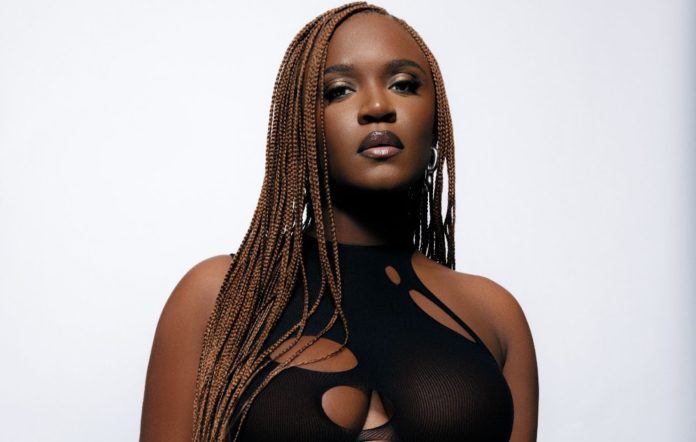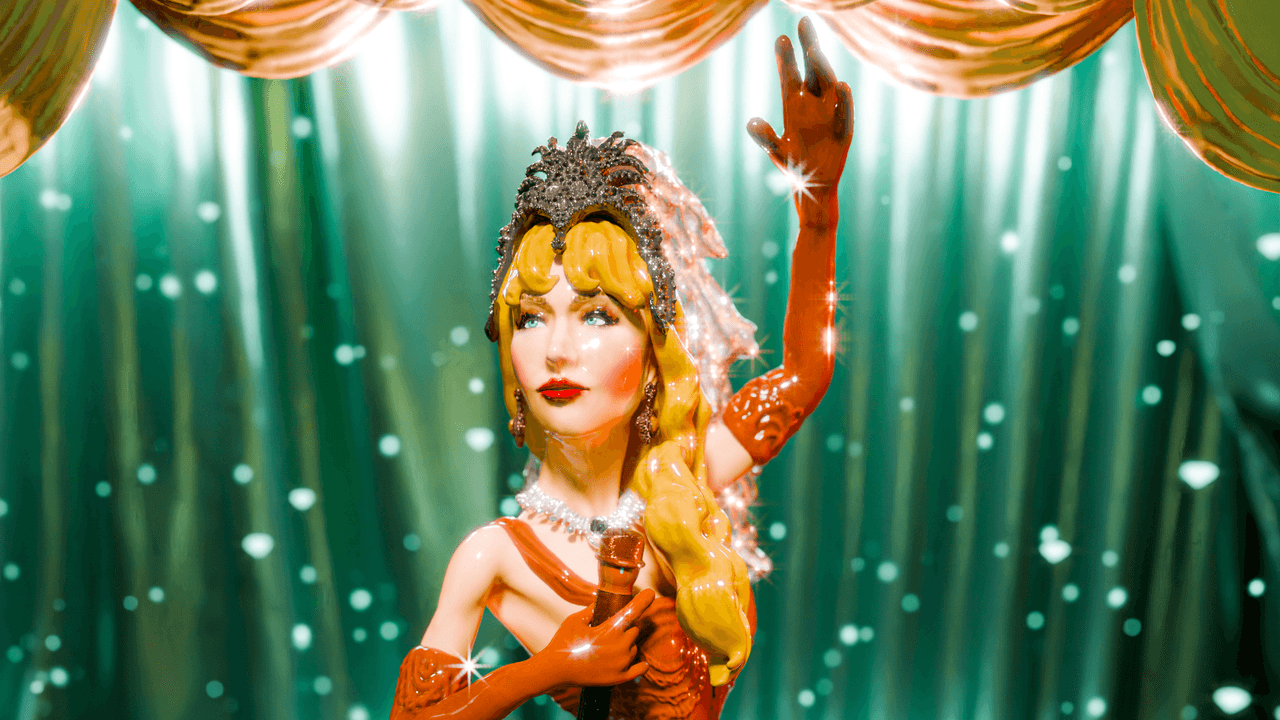
When Ghanaian-American singer Amaarae dropped her 2020 debut album ‘The Angel You Don’t Know’, she was immediately dubbed an alté-pop pioneer. After featuring Kali Uchis on the ‘Sad Girlz Luv Money’ remix the following year, the track became an internet sensation; its vibrant fusion of Latin and Afropop music catapulted Amaarae into mainstream consciousness, clocking up over 350 million Spotify streams along the way.
Using her expansive sonic approach as evidence, the 28-year-old has always been vocal about how genre categorisations for African artists are rigid and limiting, as she explained to The Guardian in 2021: “If it was left up to me, I wouldn’t even place a label on my music”. Returning with her second album ‘Fountain Baby’, her approach continues to be as fluid as the album’s title suggests. Rooted in a borderless sound that moves between orchestral strings on opener ‘All My Love’ to Senegalese rock rhythms throughout the hard-hitting ‘Counterfeit’, Amaarae highlights how diasporic living exposes one to a myriad of influences.
Since Amaarae released ‘The Angel You Don’t Know’, the popularity of African music has soared to new heights: Burna Boy became the first African artist to headline a UK stadium earlier this month; Wizkid sold out three consecutive O2 Arena shows in 2021. Looking to further establish her position in this constantly-evolving scene, Amaarae makes a significant shift as she progresses from a debut record that heavily relied on special guests, to a follow-up with no features.
The unbridled level of confidence required to take on such a feat is a testament to the singer trusting her unique approach to experimental pop. It’s a big risk – but one that instantly pays off. As the exhilarating ‘Angels In Tibet’ proves, Amaarae can carry an album independently, as her melodic rap style is underpinned by dynamic, percussion-heavy instrumentation.
On ‘Fountain Baby’, Amaarae pushes the boundaries of spirituality while exploring sexual desire. She’s developed a reputation for distinctive, sultry vocals that juxtapose her matter-of-fact lyricism, which she continues to lay down on ‘Sex, Violence, Suicide’, a thrashing punk-rock track. “Don’t care ‘bout what I’m asking you just fucking tell me yes,” she sings. “Tell me I’m the one, tell me I’m the best.”
Elsewhere, the astrology-themed anthem ‘Co-Star’ – an ode to the app used by much of Amaarae’s fanbase – details how spirituality in the diasporic community has moved away from its Abrahamic origins, which older generations were influenced by. “Me and her it felt like a threesome / Must be Gemini”,” she sings.
On ‘Fountain Baby’, Amaarae doubles down on her role as a cultural disruptor – she continues to project a striking level of self-obsession that never feels obnoxious. The boundaries for African music are constantly moving, and across this album, Amaarae pushes them even further.


For as long as we’ve known Taylor Swift, she’s played many roles, the songwriter and the storyteller, the narrator and the main character. In the last two years, she’s become both the tortured poet and the billionaire showgirl. Her 2024 album The Tortured Poets Department captured her deepest heartbreak, which unfolded alongside her greatest victories: the record-breaking Eras Tour, her long fight to reclaim her master recordings, and a whirlwind romance with her now-fiancé, Travis Kelce. Never one to take it easy, she began her next project by saying, “I want to be as proud of an album as I am of the Eras Tour, and for the same reasons.”
Swift’s twelfth studio album, The Life of a Showgirl, is anything but reserved. She opens with “The Fate of Ophelia,” a love story that lifts her away from heartbreak, not into a fairytale, but out of tragedy. On The Tortured Poets Department, she spent thirty-one songs writing her way through sorrow. Here, she seems to undo it all in just one.
The melancholy that colored her last four records is mostly gone, yet The Life of a Showgirl still feels surprisingly understated. Swift reunites with pop powerhouses Max Martin and Shellback for the first time in eight years, crafting arrangements built around crisp ’70s soft-rock drums and minimalist hip-hop beats reminiscent of Pure Heroine. The songs focus heavily on her voice and lyrics, but they don’t quite capture the lush emotional nuance she found in her collaborations with Jack Antonoff and Aaron Dessner.
Outside of “Ophelia,” the other clear radio contender is “Opalite,” a breezy pop-rock track that recalls Red-era songs like “Message in a Bottle.” The difference is that 2012 Taylor never would have started a love song with lines as biting as, “I had a bad habit of missing lovers past / My brother used to call it ‘eating out of the trash.’”
For the starry-eyed young Taylor, romance used to be the lens through which she saw everything. Now in her mid-thirties, she still portrays love as pure, but her stories come with more complications. The acoustic ballad “Eldest Daughter” begins with her guarded and detached, then gradually opening up as the song unfolds. The narrative works, but it also shows the album’s smaller emotional scope: she gives the same weight to romantic vulnerability as she does to frustrations about the internet.
That’s about as serious as Showgirl gets, in fact, it might be her funniest record yet, depending on how much you’re laughing with her. On “Father Figure,” she playfully references George Michael while poking fun at her feud with Scott Borchetta and Scooter Braun, singing, “I can make deals with the devil because my dick’s bigger!” Then there’s “Wood,” her first attempt at disco, which channels The Jackson Five’s “I Want You Back” and Diana Ross’ “I’m Coming Out.” It’s a cheeky, joyful track that nods to her fiancé’s prowess both in life and in love. “Wi$h Li$t” is equally over-the-top, think “Royals” rewritten by someone who’s as close to American royalty as you can get, yet its domestic fantasy somehow feels sweet and genuine.
When Swift stops trying to prove anything and simply exists within her music, the magic comes back. “Ruin the Friendship,” like “Betty,” captures the innocence of a teenage crush that lingers into adulthood. “Wilted corsage dangles from my wrist / Over his shoulder I catch a glimpse,” she sings, as memories of missed chances fade into a funeral decades later. Then, in the present, she mourns what could’ve been: “It was not convenient, no / But I whispered at the grave / ‘Should’ve kissed you anyway.’” Swift’s greatest gift, the one at the heart of the Eras Tour, has always been her ability to make a song feel like a lived memory, no matter how many times you hear it.
But by the next track, “Actually Romantic,” she’s back in character, reviving her “Blank Space” persona to seemingly take aim at Charli XCX. Over a grungy Pixies/Weezer-inspired beat, she taunts, “It sounded nasty but it feels like you’re flirting with me / I mind my business, God’s my witness that I don’t provoke it / It’s kind of making me… wet!” The jab feels random, especially given the references to Charli’s “Sympathy Is a Knife,” the “CANCELLED!” lyrics on this album, and their supposed reconciliation on the “Girl, So Confusing” remix. Maybe she wrote it just to amuse herself.
The closing title track nearly ties everything together. Featuring Sabrina Carpenter, Swift tells the story of an aging showgirl named Kitty who warns her about the ruthless world of fame. By the song’s end, Taylor flips the narrative, claiming her own power: “I’m immortal now, baby dolls!” She’s still marked by the battles she’s fought, but she didn’t have to lose herself to win, and she hasn’t shut the door on those who come after her. Like Elizabeth Taylor, the world might gossip about her personal life, but history will remember her career, exactly as she intended.
When Michael Jackson passed away, TIME Magazine wrote, “In the theater of celebrity tragedy, each play has three acts.” Having escaped Ophelia’s fate, Taylor Swift now finds herself in her fifth. She’s still a fascinating main character, though her focus has shifted to life under the microscope of social media. Meanwhile, outside her kingdom, the world continues to face crises, from climate change to political unrest and humanitarian disasters.
There’s nothing wrong with seeking escape, but the best pop music makes personal emotion feel like everything is at stake. Speak Now, Reputation, Folklore, her most powerful albums transformed her pain into something universal. For the first time, The Life of a Showgirl finds Taylor Swift not growing through love, but resting comfortably within it.
